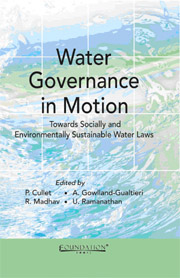Book contents
- Frontmatter
- Contents
- Acknowledgments
- Contributor Biographies
- Introduction
- I Water Law, Policy and Institutional Reforms in India
- II Ongoing Irrigation and Ground Water Reforms in India
- III Perspectives on Privatisation
- 8 Tirupur Water Supply and Sanitation Project: A Revolution in Water Resource Management?
- 9 The World Bank's Influence on Water Privatisation in Argentina: The Experience of the City of Buenos Aires
- 10 The Linkages between Access to Water and Water Scarcity with International Investment Law and The WTO Regime
- 11 More Drops for Hyderabad City, Less Crops for Farmers: Water Institutions and Reallocation in Andhra Pradesh
- IV Environment and Human Rights
- V Comparative Perspectives on Reforms
- Bibliography
9 - The World Bank's Influence on Water Privatisation in Argentina: The Experience of the City of Buenos Aires
from III - Perspectives on Privatisation
Published online by Cambridge University Press: 26 October 2011
- Frontmatter
- Contents
- Acknowledgments
- Contributor Biographies
- Introduction
- I Water Law, Policy and Institutional Reforms in India
- II Ongoing Irrigation and Ground Water Reforms in India
- III Perspectives on Privatisation
- 8 Tirupur Water Supply and Sanitation Project: A Revolution in Water Resource Management?
- 9 The World Bank's Influence on Water Privatisation in Argentina: The Experience of the City of Buenos Aires
- 10 The Linkages between Access to Water and Water Scarcity with International Investment Law and The WTO Regime
- 11 More Drops for Hyderabad City, Less Crops for Farmers: Water Institutions and Reallocation in Andhra Pradesh
- IV Environment and Human Rights
- V Comparative Perspectives on Reforms
- Bibliography
Summary
Introduction
The work of International Financial Institutions (IFIs) in developing countries has been subject to intense criticism in recent years. Detractors of the International Monetary Fund (IMF) and the development agencies forming the World Bank (WB) Group do not only deem that the contents of the policies supported by IFIs are inadequate to overcome the difficulties that member states face, but also criticise the way in which said policies are forwarded to indebted countries, which has been perceived as short of an imposition.
In a context of loss of prestige, the role of the IMF and WB Group in the contemporary wave of privatisation of public services has attracted particular attention. Indeed, privatisation has been one of the central reforms sponsored by IFIs for reducing public deficit and stimulating economic growth in developing countries. Among the public services that have been transferred to private operators in recent decades, the case of water and sanitation in urban areas has merited special study. Given their social value and the magnitude of the business that they represent, the success or failure of privatisation processes of water services has attracted in-depth analysis from both supporters and critics of the work of IFIs.
This chapter will focus on the role of the WB Group in the privatisation of water services in the city of Buenos Aires. It is by now undisputed that the processes of water services privatisation that IFIs encouraged in Argentina were less than successful.
- Type
- Chapter
- Information
- Water Governance in MotionTowards Socially and Environmentally Sustainable Water Laws, pp. 230 - 268Publisher: Foundation BooksPrint publication year: 2010

